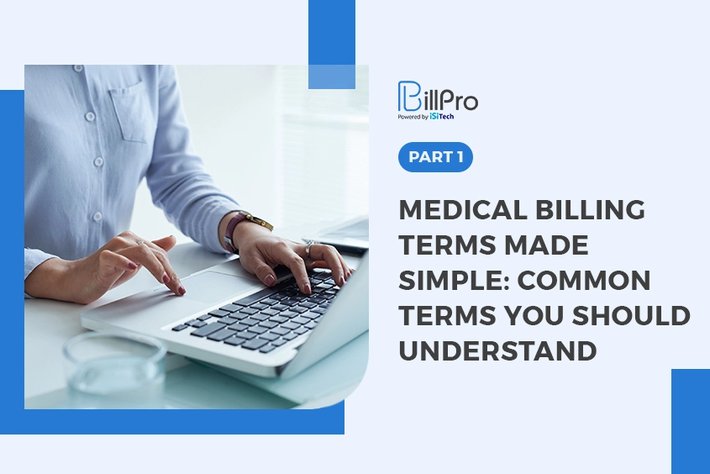Medical billing can be a daunting process for insurance companies and healthcare providers. The most minor errors can cause significant issues with payment processing and documentation. It is a complex system with its own standardized terminology required for accuracy and promptness.
With the help of medical billing software such as BillPro, it is possible to streamline the process. This ensures the timely processing of all claims and payments.
This article will help you overcome the challenges associated with medical billing terminology. We’ve covered some important and popular medical billing terms below!
Popular Medical Billing Terms
You will frequently come across these popular medical billing terms when billing and processing payments. Understanding their definitions and intricacies will help reduce errors and enhance the overall process for claims and payments.
ERA (Electronic Remittance Advice)
ERA stands for Electronic Remittance Advice. It refers to a form of electronic communication used in medical billing to eliminate paper-based explanation of benefits (EOB).
These electronic notifications are sent to the healthcare provider by the payer, and they contain all the details of the payments made for a particular claim.
ERAs are meant to contain all the essential information related to EOB, such as denied claims, paid claims, payment adjustments, and final statuses. ERA helps streamline and enhance the efficiency of payment posting for insurance claims by reducing the amount of time and resources needed to process a payment.
It also makes the billing process more cost-efficient by offering the following benefits:
-
Automated payment posting to improve productivity, accuracy, and rate of payment collection
-
Segregated paid and denied claims to keep the claim status updated and in check at all times
-
Electronic payments through electronic funds transfer (EFT), thereby making them faster
-
Electronic remittance advice reports for private and federal insurance plans
-
Little to no risk of errors by eliminating the need to manually generate an EOB statement
RVU (Relative Value Unit)
Relative value unit (RVU) refers to a standardized set of values used to determine the cost of certain services. It is assigned by Medicare and ensures physicians are compensated correctly on the basis of their productivity.
The RVU measures the complexity and resources required to provide a particular medical service and is used by the Centers for Medicare and Medicaid Services (CMS) to calculate the reimbursement rate for the services of a healthcare provider.
This takes into account various factors, including:
-
Cost of equipment and tools needed to perform a service or maintain a practice, including the rent, medical equipment, staff wages, etc.
-
Physician’s skill level and specialization
-
Time and effort needed to complete a procedure
-
Liability or malpractice expense for the provider
This system ensures that healthcare providers are fairly reimbursed and is calculated based on geographic practice cost indices (GPCIs), conversion factor (CF), and total RVUs.
ABN (Advanced Beneficiary Notice)
Advanced Beneficiary Notice (ABN) is also known as a waiver of liability. It is a notice given by a healthcare provider before performing a service—if they have reason to believe that a patient’s Medicare insurance will not cover the procedure.
ABNs vary based on the healthcare provider and may not be given to those with a Medicare Advantage Plan. They are helpful notices as they help patients make informed decisions about accepting financial responsibility. They have to pay for the service out-of-pocket, should Medicare deny paying for said service on their behalf.
ABNs clearly outline why the provider considers this service out of the scope of Medicare’s coverage. On the other hand, no ABN is given for services or treatments that are never covered under Medicare, such as hearing aids.
Healthcare providers are not permitted to have blanket ABN policies. The ABN simply acts as a warning that Medicare may not cover the service recommended by the healthcare provider. However, Medicare may still cover the payment and may not deny the claim when submitted to them.
To confirm whether or not this is the case, the patient must first sign the ABN and agree to pay for the procedure if Medicare does not.
ABN is important as it ensures that Medicare beneficiaries are fully aware of their financial responsibility before receiving a service or item that may not be covered under the same. This reduces the risk of confusion over payment responsibilities and can prevent unexpected bills and liabilities.
Clearinghouse
A clearinghouse acts as a middleman in the medical billing process. It provides information regarding medical claims to healthcare professionals and active insurance providers.
Clearinghouses are essential for medical billing procedures to operate smoothly. Their responsibilities include checking the accuracy of all medical claims, ensuring there are no errors, and verifying if the claims are processed correctly by the payers.
Once the clearinghouse thoroughly checks a claim, it is sent electronically to the insurance provider to initiate the revenue cycle.
Clearinghouses are also tasked with changing nonstandard data into standard information in the insurance provider’s system. This is so that a claim is processed expeditiously.
This is done through:
-
Ensuring the correct procedural and diagnosis codes are used in the medical claims
-
Identifying and correcting errors to reduce the number of denied claims
-
Minimizing human errors to maintain and even improve the relationships between healthcare facilities and insurance providers
-
Eliminating the need for paper forms, envelopes, and stamps, thereby simplifying and expediting the process of medical claims and payments
A clearinghouse may receive electronic remittance advice from an insurance company and forward it to a healthcare provider. It also submits the appropriate claims to the right insurance companies after verifying the accuracy and completeness of a claim and identifying and fixing any errors.
This role is crucial for streamlining the medical billing process and greatly reduces the risk of errors that can lead to denied claims or any form of delay. This way, payments are processed more efficiently, and all parties can preserve their efficient workflows.
Final Thoughts
 Medical billing is a highly sensitive process that requires attention to detail and accuracy. Small mistakes can have major consequences, such as denied claims, leading to unnecessary complications.
Medical billing is a highly sensitive process that requires attention to detail and accuracy. Small mistakes can have major consequences, such as denied claims, leading to unnecessary complications.
Understanding medical billing terminology can reduce the risk of payment and claims processing errors. Beyond that, an automated billing solution can further enhance and streamline billing operations to improve efficiency and accuracy.
BillPro is the one-stop medical billing software solution for all your medical billing needs. You no longer have to worry about errors slowing down your claims processing. Book a demo to see firsthand how you can benefit from it!
You can check the second part of this article here.

 5/5 (3 votes)
5/5 (3 votes)
 241 views
241 views



